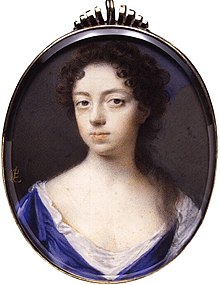The Owl Describing her Young Ones
Anne Kingsmill Finch 1661 – 1720 (Westminster)
Why was that baleful Creature made,
Which seeks our Quiet to invade,
And screams ill Omens through the Shade?
'Twas, sure, for every Mortals good,
When, by wrong painting of her Brood,
She doom'd them for the Eagle's Food:
Who proffer'd Safety to her Tribe,
Wou'd she but shew them or describe,
And serving him, his Favour bribe.
When thus she did his Highness tell;
In Looks my Young do all excel,
Nor Nightingales can sing so well.
You'd joy to see the pretty Souls,
With wadling Steps and frowzy Poles,
Come creeping from their secret Holes.
But I ne'er let them take the Air,
The Fortune-hunters do so stare;
And Heiresses indeed they are.
This ancient Yew three hundred Years,
Has been possess'd by Lineal Heirs:
The Males extinct, now All is Theirs.
I hope I've done their Beauties right,
Whose Eyes outshine the Stars by Night;
Their Muffs and Tippets too are White.
The King of Cedars wav'd his Power,
And swore he'd fast ev'n from that Hour,
Ere he'd such Lady Birds devour.
Th' Agreement seal'd, on either part,
The Owl now promis'd, from her Heart,
All his Night-Dangers to divert;
As Centinel to stand and whoop,
If single Fowl, or Shoal, or Troop
Should at his Palace aim or stoop.
But home, one Evening without Meat,
The Eagle comes, and takes his Seat,
Where they did these Conditions treat.
The Mother-Owl was prol'd away,
To seek abroad for needful Prey,
And forth the Misses came to play.
What's here ! the hungry Monarch cry'd,
When near him living Flesh he spy'd,
With which he hop'd to be supply'd.
But recollecting, 'twas the Place,
Where he'd so lately promis'd Grace
To an enchanting, beauteous Race;
He paus'd a while, and kept his Maw,
With sober Temperance, in awe,
Till all their Lineaments he saw.
What are these Things, and of what Sex,
At length he cry'd, with Vultur's Becks,
And Shoulders higher than their Necks?
These wear no Palatines, nor Muffs,
Italian Silks, or Doyley Stuffs,
But motley Callicoes, and Ruffs.
Nor Brightness in their Eyes is seen,
But through the Film a dusky Green,
And like old Margery is their Mien.
Then for my Supper they're design'd,
Nor can be of that lovely Kind,
To whom my Pity was inclin'd.
No more Delays; as soon as spoke,
The Plumes are stripped, the Grisles broke,
And near the Feeder was to choak.
When now return'd the grizly Dame,
(Whose Family was out of Frame)
Against League-Breakers does exclaim.
How! quoth the Lord of soaring Fowls,
(Whilst horribly she wails and howls)
Were then your Progeny but Owls?
I thought some Phoenix was their Sire,
Who did those charming Looks inspire,
That you'd prepar'd me to admire.
Upon your self the Blame be laid;
My Talons you've to Blood betray'd,
And ly'd in every Word you said.
Faces or Books, beyond their Worth extoll'd,
Are censur'd most, and thus to pieces pulled.
Font size:
Submitted on May 13, 2011
Modified on March 05, 2023
- 2:39 min read
- 33 Views
Quick analysis:
| Scheme | AAA XBB CCC DDD EEE FFX XGG HHH III JJX KKK LLL MMM AAA NNN OXO PPP QQE RRR SSS TTT UUU EVV IWW AAX XX |
|---|---|
| Closest metre | Iambic tetrameter |
| Characters | 2,794 |
| Words | 495 |
| Stanzas | 26 |
| Stanza Lengths | 3, 3, 3, 3, 3, 3, 3, 3, 3, 3, 3, 3, 3, 3, 3, 3, 3, 3, 3, 3, 3, 3, 3, 3, 3, 2 |
Translation
Find a translation for this poem in other languages:
Select another language:
- - Select -
- 简体中文 (Chinese - Simplified)
- 繁體中文 (Chinese - Traditional)
- Español (Spanish)
- Esperanto (Esperanto)
- 日本語 (Japanese)
- Português (Portuguese)
- Deutsch (German)
- العربية (Arabic)
- Français (French)
- Русский (Russian)
- ಕನ್ನಡ (Kannada)
- 한국어 (Korean)
- עברית (Hebrew)
- Gaeilge (Irish)
- Українська (Ukrainian)
- اردو (Urdu)
- Magyar (Hungarian)
- मानक हिन्दी (Hindi)
- Indonesia (Indonesian)
- Italiano (Italian)
- தமிழ் (Tamil)
- Türkçe (Turkish)
- తెలుగు (Telugu)
- ภาษาไทย (Thai)
- Tiếng Việt (Vietnamese)
- Čeština (Czech)
- Polski (Polish)
- Bahasa Indonesia (Indonesian)
- Românește (Romanian)
- Nederlands (Dutch)
- Ελληνικά (Greek)
- Latinum (Latin)
- Svenska (Swedish)
- Dansk (Danish)
- Suomi (Finnish)
- فارسی (Persian)
- ייִדיש (Yiddish)
- հայերեն (Armenian)
- Norsk (Norwegian)
- English (English)
Citation
Use the citation below to add this poem to your bibliography:
Style:MLAChicagoAPA
"The Owl Describing her Young Ones" Poetry.com. STANDS4 LLC, 2024. Web. 25 Apr. 2024. <https://www.poetry.com/poem/3303/the-owl-describing-her-young-ones>.



Discuss the poem The Owl Describing her Young Ones with the community...
Report Comment
We're doing our best to make sure our content is useful, accurate and safe.
If by any chance you spot an inappropriate comment while navigating through our website please use this form to let us know, and we'll take care of it shortly.
Attachment
You need to be logged in to favorite.
Log In